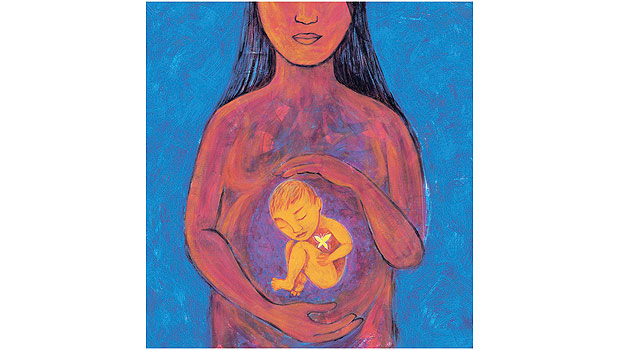Today, I chose to elaborate on gas, indigestion, constipation and hemorrhoids, other gastric problems among a series of ailments that irk pregnant mothers, giving them discomfort, pain and insomnia. However, with care, diet and natural treatment, they can be prevented or soothed without leaving any permanent damage or pain.
• Gas and indigestion are common gestation disorders. Gas and flatulence come naturally with pregnancy due to a slower digestion, acid reflux and the compression of the gut by the growing fetus. Certain foods aggravate the conditions. Legumes, certain gas-causing vegetables (cabbage), cow’s milk, sugar and spicy, fatty and fried dishes slow the transition of food, increasing its fermentation effect in the digestive tract, which leads to gas and bloating. To minimize discomfort, they should be eliminated from the diet.
Due to its richness in enzymes, papaya can ease flatulence and speed the digestive process. Frequent smaller meals and reduced portions restrict overloading the digestive system, preventing acid reflux and indigestion.
Lighter foods like stir-fried, baked and steamed vegetables, broiled, roasted or grilled skinless poultry and turkey, fish and lean meat without fatty, creamy sauces are lighter on the digestion. Leaving the stomach empty for long periods can also breed gas and acidity. Drinking water sufficiently dissipates gas, flushes down acid reflux and speeds the digestion.
Ginger, verbena and chamomile infusions soothe bloating and facilitate the digestive process. Cumin, fennel, anise seeds and cardamom made into warm drinks relieve gas, indigestion and gastric pain too.
• Constipation is another digestive complaint that occurs during gestation and may continue to after delivery if it is not treated. Due to hormonal changes as well as the baby’s positioning and low fiber and fluid intake, mothers-to-be develop a tendency toward constipation. Because the growing fetus also requires water to build the amniotic fluid around it, it takes whatever available fluids from the other body systems. With little water intake, the bowel movement is slowed down and the colon loses its ability to eliminate waste without difficulty and pain. Cow’s milk and iron supplement can sometimes cause hard to pass stools, constipation and indigestion.
What is needed to prevent constipation is paying special attention to the daily nutrition. A fiber rich diet is a required approach. Fresh whole fruits and veggies and whole grains regulate the elimination process. If necessary, dried fruits (soaked figs or prunes) can be taken in the morning to enhance the bowel movement.
Drinking plenty of purified water is necessary in between meals. It also helps to take two glasses of warm or room-temperature water on an empty stomach in the morning. Hot herbal drinks for breakfast activate a slow digestion and speed elimination. Caffeine found in tea and coffee has diuretic properties, which encourage water loss, dehydrating the intestines.
A safe fiber during pregnancy is psyllium husk supplement. It should be taken as prescribed. The fiber requires lots of water to form bulk and ease elimination.
Probiotics of four billion active bacteria are required to regulate bowel movement. Chorella (sea algae), alpha alpha and wheat and oat grasses in tablet form or their drinks offer phytonutrients and fiber that increases bulk and helps elimination. Untreated, constipation can lead to other chronic disorders like hemorrhoids, a very painful condition during pregnancy and after delivery, which requires surgery at times.
• Hemorrhoids develop often with pregnancy due to the effects of constipation and because of the weight of the growing fetus.
Finally, a nutritious diet should NOT contain processed and fried foods, food preservatives and additives (synthetic coloring and taste), artificial sugars (aspartame, saccharine), monosodium glutamate (MSG), alcohol and trans fatty acids (margarine, hydrogenated fats). Vegetable oils heated to high temperatures can turn into trans fats. Such substances are not only harmful to the mother’s health, but are also damaging to the developing brain of the fetus, resulting in learning disabilities. Of course, smoking is also toxic to the baby’s brain.
I tried to cover most of the common gastric ailments (morning sickness, acid reflux, gas, indigestion, constipation, hemorrhoids), which exasperate a pregnancy. Unless each problem is appropriately addressed, the symptoms will worsen with each and every subsequent pregnancy and possibly become chronic accompanied by pain and long-term suffering.
Next week in Part 3, I shall discuss some of the other pregnancy problems mentioned earlier.









